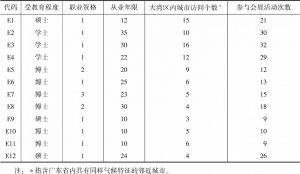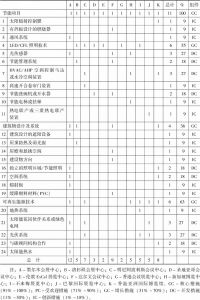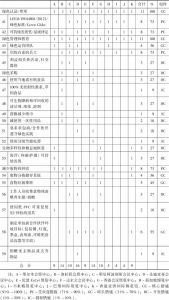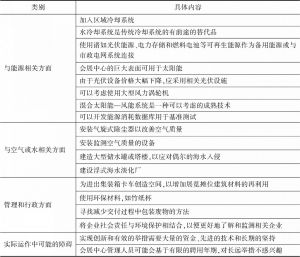摘要
会议展览活动参与者众多,大量的直接和间接的持续资源消耗会给各个会展中心的经营带来环境压力,因此该行业需要不断深入推进其环保设施规划与实践。本文探讨了经过绿色认证的国际著名的11家会展中心所采用的创新环保实践,并通过对12位环保领域专家的访谈,创建了一份适合粤港澳及中国南方地区地理和气候情况的环保设施规划的参考框架。
作者
陈伟雄 ,澳门旅游学院教授,拥有国际酒店管理集团的酒店管理和开业经验,研究方向为酒店业的节能和航空业的环保。
周勇 ,澳门旅游学院副教授,主要研究方向为目的地旅游发展及影响分析、旅游发展与社区参与及居民感知分析、会展及盛事活动管理等方面。
杨惠君 ,澳门旅游学院副教授,主要研究方向为酒店与旅游教育、酒店人力资源管理以及会展管理。
Chan Wai Hung et al.
- Asia World Expo. 2017. Caring for the Environment. from http://www.asiaworld-expo.com/about-us/corporate-social-responsibility-1/_caringforenvironment.
- Becken,S.,and J. E. Hay. 2007. Tourism and Climate Change:Risks and Opportunities (Clevedon:Channel View Publications).
- Becken,S.,D. G. Simmons,and C. Frampton. 2003. “Energy Use Associated with Different Travel Choices.” Tourism Management 24:267-277.
- Chan,W.,and B. Mak. 2005. “An Analysis of the Environmental Reporting Structures of Selected European Airlines.” International Journal of Tourism Research 7:249-259.
- Chan,W. 2009. “Environmental Methods for Hotels’ Environmental Management Systems ISO 14001.” International Journal of Contemporary Hospitality Management 21:532-560.
- Chen,K. 2009. “Research Report on Chinese Convention and Exhibition Industry.” Business Community. March 24.
- Darwin Convention Center. 2017. Sustainability Initiatives. Retrieved November 17,from https://www.darwinconvention.com.au/sustainability-initiatives.html.
- Dubois,G.,and J. P. Ceron. 2006. “Tourism and Climate Change:Proposals for a Research Agenda.” Journal of Sustainable Tourism 14:399-415.
- Easterby-Smith,M.,R. Thorpe,and A. Lowe. 2002. Management Research:An Introduction (London:Sage).
- Green Meeting Industry Council. 2008. Why Sustainability? Retrieved November 2,from http://greenmeetings.info/Why We Do It.html.
- Grossling,S.,and P. Svensson. 2006. “Tourist Perceptions of Climate Change:A Study of International Tourists in Zanzibar.” Current Issues in Tourism 9:419-435.
- Hong Kong Convention and Exhibition Center. 2017. Sustainability Commitment. Retrieved November 12,from https://www.hkcec.com/en/sustainability-commitment.
- Hoyer,K. G.,and P. Naess. 2001. “The Ecological Traces of Growth:Economic Growth,Liberalization,Increased Consumption—and Sustainable Urban Development?” Journal of Environmental Policy and Planning 3:177-192.
- International Trade Center Paris. 2017. A Comprehensive Range of Associated Facilities. Retrieved November 10,from https://www.itc-paris.com/en/infrastructures-itc-paris-roissy-cdg-business-convention-complex.
- Kelly,J.,and P. W. Williams. 2007. “Modelling Tourism Destination Energy Consumption and Greenhouse Gas Emissions:Whistler,British Columbia,Canada.” Journal of Sustainable Tourism 15:67-90.
- Latham,G. P.,and L. M. Saari. 1984. “Do People Do What They Say?Further Studies on the Situational Interview.” Journal of Applied Psychology 69:569-573.
- Law,C.,(Ed.). 2004. Urban Tourism:The Visitor Economy and the Growth of Large Cities (New York:Continuum).
- Lincoln,Y. S.,and E. G. Guba. 1986. “But is It Rigorous?Trustworthiness and Authenticity in Naturalistic Evaluation.” New Directions for Evaluation 30:73-84.
- Lo,J. Y.,W. Chan,and C. X. Zhang. 2014. “Tools for Benchmarking and Recognizing Hotels’ Green Effort-Environmental Assessment Methods and Eco-labels.” Journal of China Tourism Research 10:165-185.
- Los Angeles Convention Center. 2017. Environmental Sustainability. Retrieved November 10,from https://www.lacclink.com/about/green-initiatives.
- Lu,T. Y.,and L. P. Cai. 2011. “An Analysis of Image and Loyalty in Convention and Exhibition Tourism in China.” Event Management 15:37-48.
- Mak,B.,and W. Chan. 2006. “Environmental Reporting of Airlines in the Asia Pacific Region.” Journal of Sustainable Tourism 14:618-628.
- Mak,B. L.,W. W. Chan,K. Wong,and C. Zheng. 2007. “Comparative Studies of Standalone Environmental Reports-European and Asian Airlines.” Transportation Research Part D:Transport and Environment 12:45-52.
- Mak,B. L.,W. W. Chan,D. Li,L. Liu,and K. F. Wong. 2013. “Power Consumption Modeling and Energy Saving Practices of Hotel Chillers.” International Journal of Hospitality Management 33:1-5.
- Martin,P. Y.,and B. A. Turner. 1986. “Grounded Theory and Organizational Research.” The Journal of Applied Behavioral Science 22:141-157.
- Meeting Strategies Worldwide. 2006. What is a Green Meeting?Retrieved May 1,from http://www.meetingstrategiesworldwide.com/files/articles/mswwwwhatgreenmtgs.pdf.
- Melbourne Convention Exhibition Center. 2017. Why Choose MCEC. Retrieved November 10,from http://mcec.com.au/plan-an-event/why-choose-mcec/.
- Messe Bremen Exhibition Center. 2017. A Green Vision for the Future. Retrieved October 10,from http://www.bremen-tourism.de/messe-bremen-3.
- Miles,M. B.,and A. M. Huberman. 1994. Qualitative Data Analysis:An Expanded Sourcebook (London:Sage).
- Ministry of Commerce. 2016. China Convention and Exhibition Industry Development Report,Ministry of Commerce,China.
- Minneapolis Convention Center. 2017. Sustainability. Retrieved December 15,from https://www.minneapolis.org/minneapolis-convention-center/about/sustainability/.
- Patton,M. 1987. How to Use Qualitative Methods in Evaluation (California:Sage).
- San Diego Convention Center. 2017. Meetings. Retrieved October 15,from https://visitsandiego.com/facility/green-meetings.
- Scott,D.,P. Peeters,and S. Gossling. 2010. “Can Tourism Deliver Its ‘Aspirational’ Greenhouse Gas Emission Reduction Targets?” Journal of Sustainable Tourism 18:393-408.
- Singapore Convention and Exhibition Expo. 2017. Max Atria @ Singapore EXPO Wins BCA Green Mark Platinum Award. Retrieved December 15,from https://www.newswire.com/max-atria-singapore-expo-wins-bca/114297.
- Singapore Management University. 2017. Cooperation is Key to Building China’s Bay Area. Retrieved April 13,from https://www.smu.edu.sg/perspectives/2017/08/31/cooperation-key-building-chinas-bay-area.
- Spiller,J.,K. Weber,and K. S. Chon. 2002. “History of Convention Tourism.” Convention Tourism:International Research and Industry Perspectives 25:3-20.
- Teng,C. C.,J. S. Horng,M. L. Hu,L. H. Chien,and Y. C. Shen. 2012. “Developing Energy Conservation and Carbon Reduction Indicators for the Hotel Industry in Taiwan.” International Journal of Hospitality Management 31:199-208.
- UFI. 2014. Global Exhibition Industry Statistics. Retrieved March 12,from http://www.ufi.org/wp-content/uploads/2016/01/2014_exhibiton_industry_statistics_b.pdf.
- UFI. 2017. Global Exhibition Barometer.19th Edition. Retrieved July 10,from http://www.cbbs.hr/wp-content/uploads/2017/08/UFI_Global_Exhibition_Barometer_report19.pdf.
- U.S. Building Council. 2017. Healthy,Green Buildings. Retrieved October 15,from https://new.usgbc.org/.
- USEPA. 2000. A Method for Quantifying Environmental Indicators of Selected Leisure Activities in the United States. Washington,DC:Office of Policy,Economics,and Innovation,US Environmental Protection Agency.
- U.S. Department of Energy. 2015. Quadrennial Technology Review:An Assessment of Energy Technologies and Research Opportunities. Retrieved July 10,2018,from https://www.energy.gov/sites/prod/files/2017/03/f34/qtr-2015-chapter5.pdf.
- Walsh,K. 2003. “Qualitative Research:Advancing the Science and Practice of Hospitality.” Cornell Hotel and Restaurant Administration Quarterly 44:66-74.
- Wu,P.,and P. Shi. 2011. An Estimation of Energy Consumption and CO2 Emissions in Tourism Sector of China.” Journal of Geographical Sciences 21:733-745.







